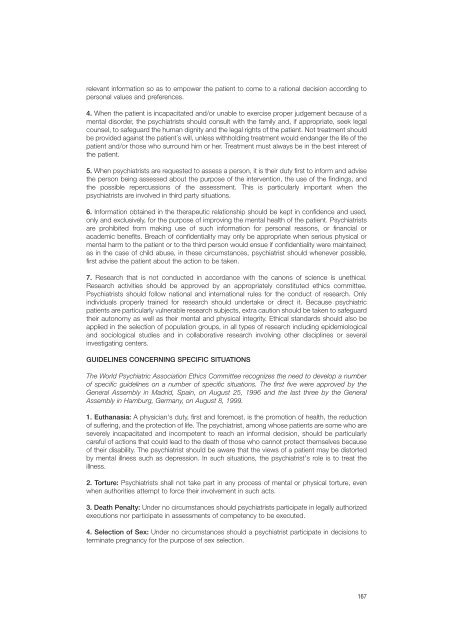human rights and legislation who resource book on mental health
human rights and legislation who resource book on mental health
human rights and legislation who resource book on mental health
Create successful ePaper yourself
Turn your PDF publications into a flip-book with our unique Google optimized e-Paper software.
elevant informati<strong>on</strong> so as to empower the patient to come to a rati<strong>on</strong>al decisi<strong>on</strong> according to<br />
pers<strong>on</strong>al values <str<strong>on</strong>g>and</str<strong>on</strong>g> preferences.<br />
4. When the patient is incapacitated <str<strong>on</strong>g>and</str<strong>on</strong>g>/or unable to exercise proper judgement because of a<br />
<strong>mental</strong> disorder, the psychiatrists should c<strong>on</strong>sult with the family <str<strong>on</strong>g>and</str<strong>on</strong>g>, if appropriate, seek legal<br />
counsel, to safeguard the <str<strong>on</strong>g>human</str<strong>on</strong>g> dignity <str<strong>on</strong>g>and</str<strong>on</strong>g> the legal <str<strong>on</strong>g>rights</str<strong>on</strong>g> of the patient. Not treatment should<br />
be provided against the patient´s will, unless withholding treatment would endanger the life of the<br />
patient <str<strong>on</strong>g>and</str<strong>on</strong>g>/or those <str<strong>on</strong>g>who</str<strong>on</strong>g> surround him or her. Treatment must always be in the best interest of<br />
the patient.<br />
5. When psychiatrists are requested to assess a pers<strong>on</strong>, it is their duty first to inform <str<strong>on</strong>g>and</str<strong>on</strong>g> advise<br />
the pers<strong>on</strong> being assessed about the purpose of the interventi<strong>on</strong>, the use of the findings, <str<strong>on</strong>g>and</str<strong>on</strong>g><br />
the possible repercussi<strong>on</strong>s of the assessment. This is particularly important when the<br />
psychiatrists are involved in third party situati<strong>on</strong>s.<br />
6. Informati<strong>on</strong> obtained in the therapeutic relati<strong>on</strong>ship should be kept in c<strong>on</strong>fidence <str<strong>on</strong>g>and</str<strong>on</strong>g> used,<br />
<strong>on</strong>ly <str<strong>on</strong>g>and</str<strong>on</strong>g> exclusively, for the purpose of improving the <strong>mental</strong> <strong>health</strong> of the patient. Psychiatrists<br />
are prohibited from making use of such informati<strong>on</strong> for pers<strong>on</strong>al reas<strong>on</strong>s, or financial or<br />
academic benefits. Breach of c<strong>on</strong>fidentiality may <strong>on</strong>ly be appropriate when serious physical or<br />
<strong>mental</strong> harm to the patient or to the third pers<strong>on</strong> would ensue if c<strong>on</strong>fidentiality were maintained;<br />
as in the case of child abuse, in these circumstances, psychiatrist should whenever possible,<br />
first advise the patient about the acti<strong>on</strong> to be taken.<br />
7. Research that is not c<strong>on</strong>ducted in accordance with the can<strong>on</strong>s of science is unethical.<br />
Research activities should be approved by an appropriately c<strong>on</strong>stituted ethics committee.<br />
Psychiatrists should follow nati<strong>on</strong>al <str<strong>on</strong>g>and</str<strong>on</strong>g> internati<strong>on</strong>al rules for the c<strong>on</strong>duct of research. Only<br />
individuals properly trained for research should undertake or direct it. Because psychiatric<br />
patients are particularly vulnerable research subjects, extra cauti<strong>on</strong> should be taken to safeguard<br />
their aut<strong>on</strong>omy as well as their <strong>mental</strong> <str<strong>on</strong>g>and</str<strong>on</strong>g> physical integrity. Ethical st<str<strong>on</strong>g>and</str<strong>on</strong>g>ards should also be<br />
applied in the selecti<strong>on</strong> of populati<strong>on</strong> groups, in all types of research including epidemiological<br />
<str<strong>on</strong>g>and</str<strong>on</strong>g> sociological studies <str<strong>on</strong>g>and</str<strong>on</strong>g> in collaborative research involving other disciplines or several<br />
investigating centers.<br />
GUIDELINES CONCERNING SPECIFIC SITUATIONS<br />
The World Psychiatric Associati<strong>on</strong> Ethics Committee recognizes the need to develop a number<br />
of specific guidelines <strong>on</strong> a number of specific situati<strong>on</strong>s. The first five were approved by the<br />
General Assembly in Madrid, Spain, <strong>on</strong> August 25, 1996 <str<strong>on</strong>g>and</str<strong>on</strong>g> the last three by the General<br />
Assembly in Hamburg, Germany, <strong>on</strong> August 8, 1999.<br />
1. Euthanasia: A physician's duty, first <str<strong>on</strong>g>and</str<strong>on</strong>g> foremost, is the promoti<strong>on</strong> of <strong>health</strong>, the reducti<strong>on</strong><br />
of suffering, <str<strong>on</strong>g>and</str<strong>on</strong>g> the protecti<strong>on</strong> of life. The psychiatrist, am<strong>on</strong>g <str<strong>on</strong>g>who</str<strong>on</strong>g>se patients are some <str<strong>on</strong>g>who</str<strong>on</strong>g> are<br />
severely incapacitated <str<strong>on</strong>g>and</str<strong>on</strong>g> incompetent to reach an informal decisi<strong>on</strong>, should be particularly<br />
careful of acti<strong>on</strong>s that could lead to the death of those <str<strong>on</strong>g>who</str<strong>on</strong>g> cannot protect themselves because<br />
of their disability. The psychiatrist should be aware that the views of a patient may be distorted<br />
by <strong>mental</strong> illness such as depressi<strong>on</strong>. In such situati<strong>on</strong>s, the psychiatrist's role is to treat the<br />
illness.<br />
2. Torture: Psychiatrists shall not take part in any process of <strong>mental</strong> or physical torture, even<br />
when authorities attempt to force their involvement in such acts.<br />
3. Death Penalty: Under no circumstances should psychiatrists participate in legally authorized<br />
executi<strong>on</strong>s nor participate in assessments of competency to be executed.<br />
4. Selecti<strong>on</strong> of Sex: Under no circumstances should a psychiatrist participate in decisi<strong>on</strong>s to<br />
terminate pregnancy for the purpose of sex selecti<strong>on</strong>.<br />
167

















